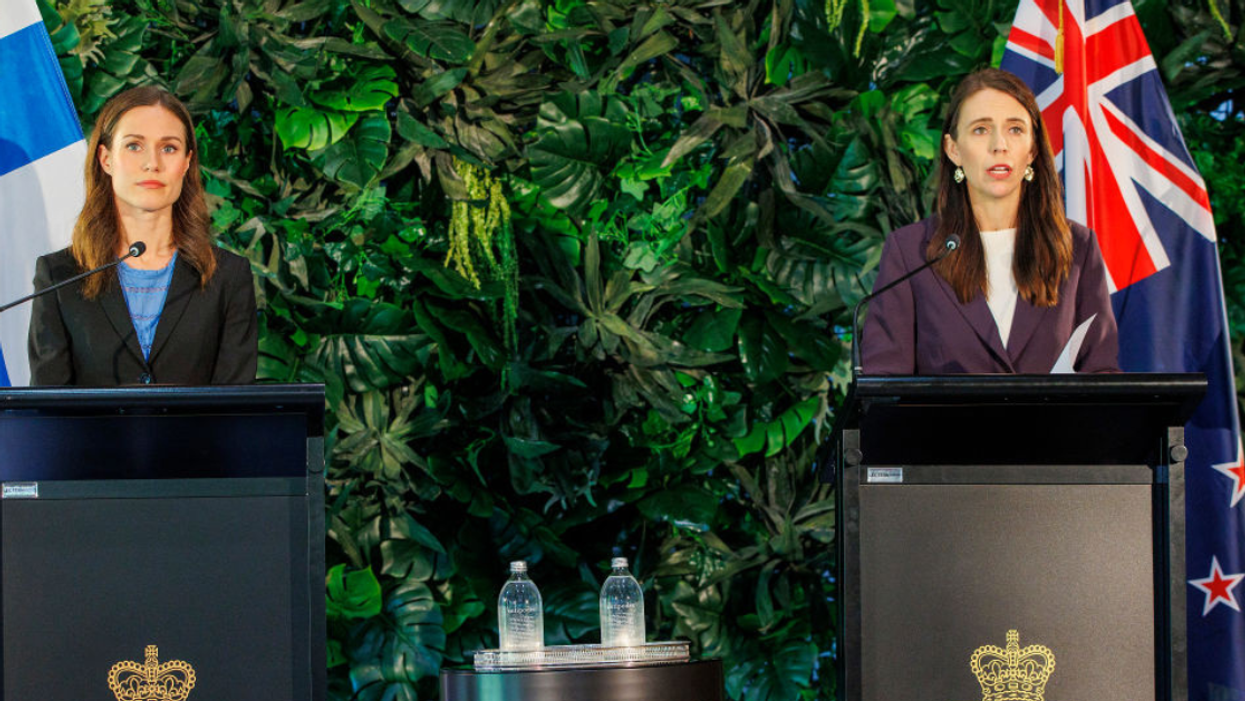New Zealand Prime Minister Jacinda Ardern and Finland Prime Minister Sanna Marin quickly dismissed a male reporter's suggestion they only met because they're both young women.
During a joint press conference on Wednesday, November 30 which was held to highlight Marin's visit to Auckland—New Zealand's cultural capital—Ardern was forced to interject after the reporter suggested they met "just because" of their age and gender.
Ardern and Marin are two of the world's youngest state leaders, aged 42 and 37 respectively.
You can watch what happened in the video below.
Reporter Joey Dwyer—who works for New Zealand radio network Newstalk ZB—asked:
"A lot of people will be wondering are you two meeting just because you're similar in age and, you know, got a lot of common stuff there, you know, when you got into politics and stuff, or can Kiwis actually expect to see more deals between our two countries down the line?"
Before Dwyer could say anything else, Ardern interjected:
"My first question is I wonder whether or not anyone ever asked [former U.S. President] Barack Obama and [former New Zealand Prime Minister] John Key if they met because they were of similar age."
"We of course have a higher proportion of men in politics. It's reality. But because two women meet, it's not simply because of their gender."
"Finland exports into New Zealand NZ$199 million worth of exports. They have particular technology in companies like Nokia, biofuels, even basic industrial wares that we use in our buildings, you won't be aware that a large number of our elevators come out of Finland, agricultural machinery."
"New Zealand, on the other hand, is trading about NZ$14 million worth, and it's mostly in wine and beef. There is huge potential between us. The [European Union Free Trade Agreement] is a launchpad for that."
Ardern continued to highlight the benefits of the New Zealand-Finland economic relationship, which would grant Finland greater economic independence from authoritarian regimes, noting Marin arrived with a "high level trade delegation of significant industry leaders" to "really leverage the economic opportunities between our two countries."
She added:
"Little would be known about the depth of that relationship or the potential of it but it's our job to further it, regardless of our gender."
When it was her turn to speak, Marin was also quick to shut Dwyer down, outlining the significance of her diplomatic visit which focuses on trade and sustainable development.
"Yeah, we are meeting because we are Prime Ministers, of course. But as Jacinda said, we have a business delegation with us. We have a lot of things in common, but also a lot of things where we can do much more together."
"One of those things are technologies. I really worry about the dependencies we have right now on authoritarian countries when it comes to new technologies, the digital infrastructure in our societies, and also the natural resources that we are dependent on."
"We have to make sure that we are not building the same traps when it comes to new technologies and digital solutions that we have right now in Europe when it comes to energy from Russia, so we have to make sure that we have the value chains, that we have the cooperation between democratic countries, especially when it comes to knowledge, know-how, new technologies, and I think this is one of the main issues we will continue discussing later today."
Many have spoken out against the inherent sexism while praising Ardern and Marin for their eloquent responses.
Neither of the two state leaders are strangers to questions centered on their gender as a disadvantage or condescension and suggestions it might hamper their abilities to lead.
Nevertheless, they enjoy considerable popularity in their respective countries.
Ardern's administration has been praised for its work tackling New Zealand's housing crisis, social inequality and in particular child poverty through the passage of the landmark Child Poverty Reduction Act, expanding school lunch programs, increasing main welfare benefits, expanding free doctor's visits, providing free menstrual hygiene products in schools, and adding to state housing stocks.
Additionally, she has been widely lauded for her leadership during the COVID-19 pandemic, making New Zealand one of the few Western nations to successfully contain the virus. In 2020, Ardern led New Zealand's Labor Party to a landslide victory, the first time a majority government had been formed since the introduction of a proportional representation system in 1996.
Marin is the youngest Prime Minister in Finnish history, entering office at the age of 34.
She has been vocal about the necessity for the European Union (EU) to end its dependency on Russian oil, particularly in the aftermath of Russia's invasion of Ukraine, and has led Finland's efforts to join the North Atlantic Treaty Organization (NATO) to counter Russian aggression.
Marin's detractors have accused her of lacking maturity and competency, particularly after leaked videos of Marin partying and dancing in a private apartment in Helsinki became public.
She has continued, however, to enjoy popularity both at home and abroad, receiving commemorations in numerous international publications, including the German newspaper Bild, which referred to her as the "coolest politician in the world."








 The Benny Show
The Benny Show





 @neilforreal/Bluesky
@neilforreal/Bluesky @savannahcat/Bluesky
@savannahcat/Bluesky @qadishtujessica.inanna.app
@qadishtujessica.inanna.app @v-ron/Bluesky
@v-ron/Bluesky @nelnelnellie/Bluesky
@nelnelnellie/Bluesky @beatlenumber9/Bluesky
@beatlenumber9/Bluesky @pinkzombierose/Bluesky
@pinkzombierose/Bluesky
 @theunobsolete/TikTok
@theunobsolete/TikTok @theunobsolete/TikTok
@theunobsolete/TikTok @theunobsolete/TikTok
@theunobsolete/TikTok @theunobsolete/TikTok
@theunobsolete/TikTok @theunobsolete/TikTok
@theunobsolete/TikTok @theunobsolete/TikTok
@theunobsolete/TikTok @theunobsolete/TikTok
@theunobsolete/TikTok @theunobsolete/TikTok
@theunobsolete/TikTok @theunobsolete/TikTok
@theunobsolete/TikTok @theunobsolete/TikTok
@theunobsolete/TikTok @theunobsolete/TikTok
@theunobsolete/TikTok @theunobsolete/TikTok
@theunobsolete/TikTok @theunobsolete/TikTok
@theunobsolete/TikTok @theunobsolete/TikTok
@theunobsolete/TikTok @theunobsolete/TikTok
@theunobsolete/TikTok @theunobsolete/TikTok
@theunobsolete/TikTok @theunobsolete/TikTok
@theunobsolete/TikTok
 @laysuperstar/TikTok
@laysuperstar/TikTok @laysuperstar/TikTok
@laysuperstar/TikTok @laysuperstar/TikTok
@laysuperstar/TikTok @laysuperstar/TikTok
@laysuperstar/TikTok @laysuperstar/TikTok
@laysuperstar/TikTok @laysuperstar/TikTok
@laysuperstar/TikTok @laysuperstar/TikTok
@laysuperstar/TikTok @laysuperstar/TikTok
@laysuperstar/TikTok @laysuperstar/TikTok
@laysuperstar/TikTok @laysuperstar/TikTok
@laysuperstar/TikTok @laysuperstar/TikTok
@laysuperstar/TikTok @laysuperstar/TikTok
@laysuperstar/TikTok @laysuperstar/TikTok
@laysuperstar/TikTok @laysuperstar/TikTok
@laysuperstar/TikTok @laysuperstar/TikTok
@laysuperstar/TikTok